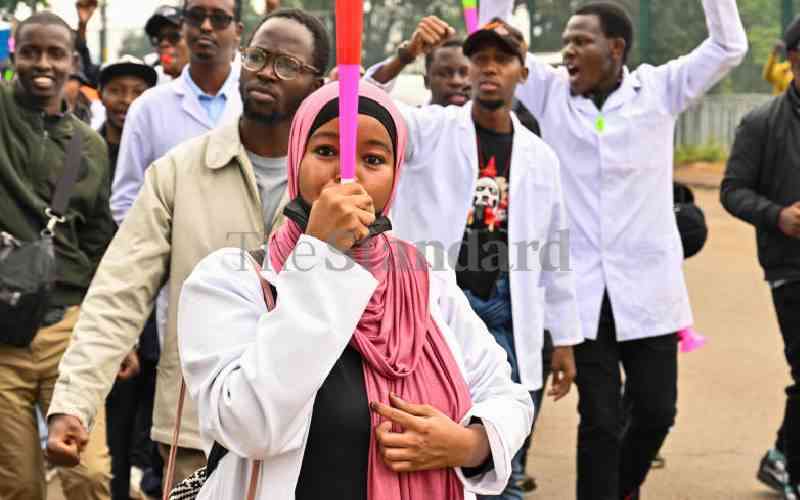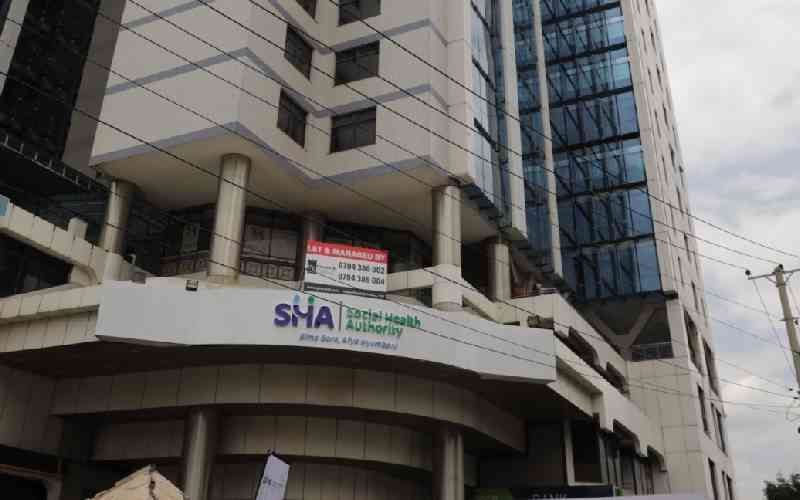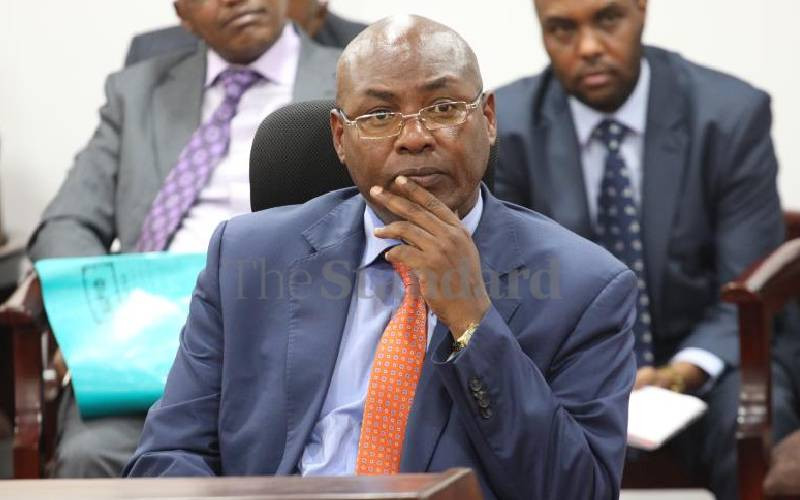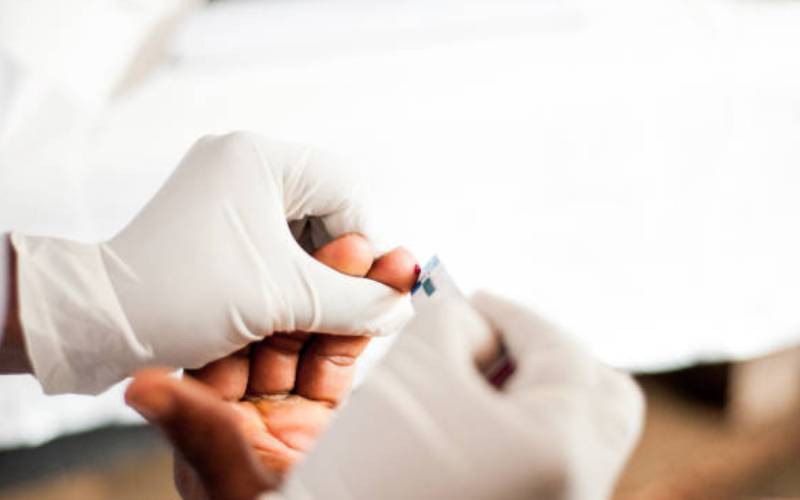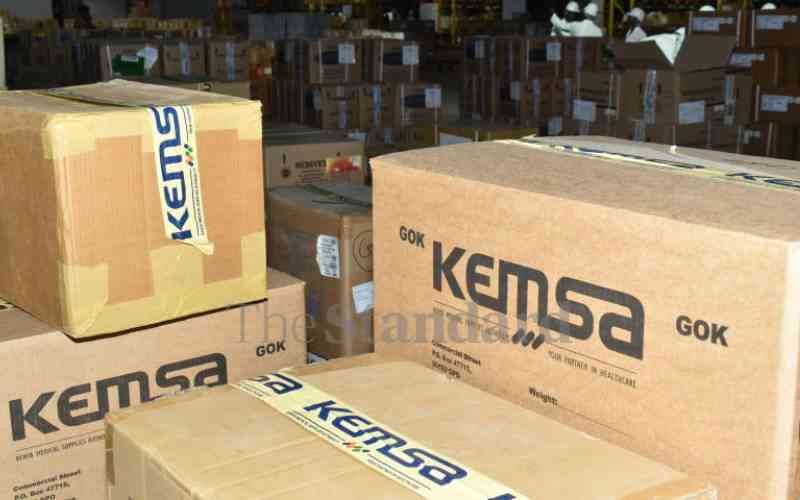
The procurement mess at Kenya Medical Supplies Authority got thicker on Tuesday as the top officials sacked and suspended over the scandal spoke for the first time, with a blame game taking centre stage.
In a game of musical chairs, each of the officials who appeared before a Senate committee investigating the Sh3.7 billion mosquito nets scam distanced themselves from the mess.
Neither sacked Public Health PS Josephine Mburu and board chairman Daniel Rono, nor the suspended Kemsa CEO Terry Ramadhani even came close to owning up to the irregularities that led to the cancellation of tender by the Global Fund.
Dr Mburu, the first top government official in the Kenya Kwanza administration to be fired, and Mr Rono, said the tendering process was already underwear by the time they came into office. Mburu was sworn into office in December while Rono took over in February.
Mburu said on February 21, she was notified by an employee from the Ministry of Health about an omission on the specifications of the nets in a newspaper advert. She then wrote to Ms Ramadhani to rectify the specification, adding that her role ended when she raised the concern over the omission.
"I was not involved in the process. The process had already started by the time I came in. I was told the new government (Kenya Kwanza) had to continue with the process. I believe the staff advised properly," Mburu told the committee, chaired by Uasin Gishu Senator Jackson Mandago.
Mburu said operations at Kemsa are overseen by Medical Services, then overseen by PS Peter Tum, and not the Public Health Department, which she was in charge of when the scandal was reported.
- Boost for reproductive health as Kenya receives 450,000 contraceptives
- New Kemsa boss now promises a brighter day for scandalous body
- Kenya secures Sh59.7 billion Global Fund commitment to combat HIV, TB and Malaria
- KEMSA feted with global award amid ongoing reforms
Keep Reading
Tum has since been transferred to the Ministry of Sports in the same capacity.
"I cannot discuss the board of Kemsa or its operations because it was not in my ministry," Mburu said.
She however admitted to nominating two people from the ministry to the tendering committee, saying this was the closest she got involved.

"The only thing l changed was the removal of two people from the tendering committee by adding two people from my office," said Mburu.
She said the pair was to help her understand the tendering process regarding the nets.
Rono maintained his innocence saying he learnt about the cancellation of the Sh3.7 billion tender while undergoing an induction meeting in Naivasha.
He said he first met the Global Fund team during a meeting where the management of Kemsa was being taken through the document for cancellation of the tender.
"I was technically green in the matter. I got the tendering process ongoing when I got into office as the new chairman of Kemsa. The board was not in control of the tender, and we never sat to deliberate on the tender," he said.
Rono, who had been in office for only three months, said despite Kenya losing the contract, Kemsa requested the donor to give the country the job of warehousing and distributing the mosquito nets.
Ramadhani maintained that the Global Fund is yet to give finer details of what led to the cancellation of the tender.
She said changes in the specifications of the mosquito nets were not the main reason Kenya lost the tender to an international supplier, Wambo.org.
Ramadhani explained that the first meeting between the authority and the donor was to review Global Fund's report on the tendering process. This was after the Fund had pointed out some inconsistencies in the tendering process.
"We met the Global Fund officials over the cancellation of the tender but we did not understand the issues raised. We followed the Global Fund's procedure while tendering. I do not know why the tender was cancelled. Reasons given by Global Fund do not hold water," said the suspended CEO.
A second meeting, which was to be held with the donor, failed because it was to happen the same week the management of Kemsa was suspended by President William Ruto.
Ramadhani clarified that Kemsa's request to re-advertise and tender afresh was rejected, as the donor cited the urgency of the distribution of the mosquito nets, in fighting malaria.

"Due to urgency in the distribution of the nets, they sought another supplier. There was no time for extension, and we agreed that they buy the nets," she said.
She added that during the first meeting, Global Fund clarified to the authority why they cancelled the two bidders that had been presented by Kemsa. She said the only issue that the Fund had with the bidders was pagination in their tender papers.
"We differed with Global Fund but since they raised issues on time constraints, we could not urge much," said the suspended CEO.
However, Ramadhani maintained that the tendering process, as conducted by Kemsa, was above board. She said they followed the same procedure they have used in the past, with the donor.
She said despite the letter written to her by the former PS Mburu, indicating the omission on specifications of the nets, the Global Fund had only approved pyrethroid nets, and not PBO- insecticide nets.
The specifications had been suggested as one of the omissions which noticed by an employee in the Department of Health, as mentioned by Mburu during the probe.
Ramadhani said she was not aware as to whether the specifications of the nets had changed as per the requirement of the donor. She said they also informed The National Treasury of the intention to extend the tendering process after Mburu's letter.
Ramadhani admitted that Kenya lost approximately Sh70 million following the cancellation of the tender,
 The Standard Group Plc is a multi-media organization with investments in media platforms spanning newspaper print
operations, television, radio broadcasting, digital and online services. The Standard Group is recognized as a
leading multi-media house in Kenya with a key influence in matters of national and international interest.
The Standard Group Plc is a multi-media organization with investments in media platforms spanning newspaper print
operations, television, radio broadcasting, digital and online services. The Standard Group is recognized as a
leading multi-media house in Kenya with a key influence in matters of national and international interest.

